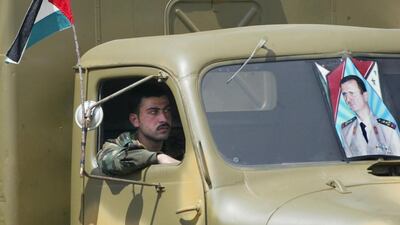Lebanon has had its fair share of crises in its short history as an independent nation. The 1958 civil war, which witnessed the bizarre sight of US Marines hitting the shores of Beirut amid startled sunbathers, was short but killed up to 4,000 people. When civil strife next visited the country in 1975, that conflict lasted 15 years claiming upwards of 100,000 lives.
It was the latter war that marked see the beginning of a Syrian occupation of Lebanon. At its peak, about 30,000 Syrian soldiers asserted control right across the country. Lasting nearly three decades, Syria’s dominance over its smaller neighbour only served to add more fuel to a sectarian fire that – even with the cessation of hostilities in Lebanon in 1990 – continued to burn.
Today marks 10 years since Syria’s complete withdrawal from Lebanon, an event that, coming just two months after the brutal assassination of former Lebanese premier Rafiq Hariri, sparked mass celebration. April 26, 2005 may have signalled the day when the last members of the Syrian military departed from Lebanese territory, but few could have imagined a time when the country returned in the shape of a million-plus refugees.
Syria remains the worst humanitarian tragedy in modern times, yet Lebanon has continued to do what it has done so manfully during times of terminal trouble – survive.
In dealing with inter-factional violence between pro- and anti-Assad forces and repelling the brutal spectre of ISIL from the border, Lebanon has withstood the slide into Syria’s vortex of war.
Yet, in accommodating 1.5 million Syrian refugees, Lebanon’s propensity to survive in its current state is being stretched almost beyond plausibility.
The statistics make for grim reading. Lebanon is a country with an indigenous population of around four million – about one in five people living there today is a refugee from Syria. Add that to 500,000 Palestinian refugees and others, including Iraqis, and it equates to hosting the highest proportion of refugees anywhere in the world. Think about that for a moment: a country, which can be travelled by car from north to south in just three hours playing host to refugees on an industrial scale. It simply beggars belief that little Lebanon should have to absorb this mass of individuals. And its major domestic woes – the near year-long inability to agree upon a new president included – make such a predicament even harder to comprehend. Indeed, as it struggles to govern on a day-to-day basis, let alone deal with copious amounts of refugees, Lebanon is surrounded by regional anarchy that rages on unabated as it bobs in the swell.
Lebanon doesn’t need any lessons on the domestic repercussions of absorbing fleeing populations, of course.
Across the country, Palestinian refugees live hand-to-mouth in some of the most abject conditions possible as most wait forlornly to return to a Palestine that has faded from the pages of history.
I recall my first visit to Ain Al Hilweh Palestinian refugee camp in 2002 in Sidon, southern Lebanon – the country’s largest and most volatile. There I met kindness, despair and hopelessness – and was reminded that decades had passed since the first wave of Palestinians fled their homes to Lebanon following the creation of Israel in 1948.
Lebanon’s Syrian refugees have not been displaced for as long as their Palestinian counterparts – but hopes of a swift return look bleak. And one shouldn’t forget that, whatever Lebanon’s own problems, they are but blameless victims simply looking to survive.
Many may praise Lebanon’s ability to withstand such pressures – but few are blinded by the fact that all things have their breaking point.
It is to Lebanon’s credit that, despite appearances to the contrary, structures (however strained) are in place to support and even promote civic life.
Without some semblance of society, Lebanon would have taken the route to failed state. Indeed, what binds most Lebanese is the strong will to resist another devastating civil war, and to that end Lebanon has succeeded – so far. But, when war comes visiting from next door in the form of 1.5 million desperate refugees, Lebanon has a right to feel cheated in its own attempt to escape a dark past that has cast a long shadow.
Alasdair Soussi’s book, In The Shadow Of The Cotton Tree, is out now
On Twitter: @AlasdairSoussi

